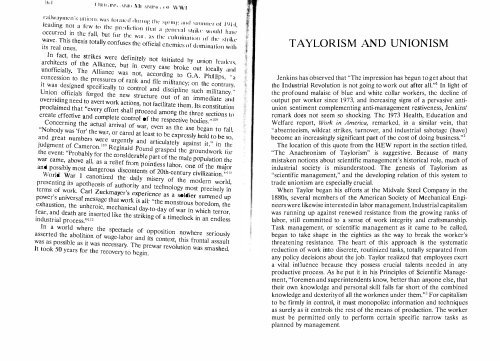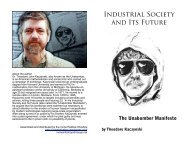CONTENTS - ouroboros ponderosa
CONTENTS - ouroboros ponderosa
CONTENTS - ouroboros ponderosa
Create successful ePaper yourself
Turn your PDF publications into a flip-book with our unique Google optimized e-Paper software.
()Ir("N', .\Nl l l\'11 ,\NINr, ( H' \\/ \.VI<br />
r;rilw;IYIIIl'Il ',,\ ulliolls w; .. " h.ll lllcd I . . .<br />
leading not a f. I I<br />
. . (.111111'., Ill< SI" III): ;llId ."I/IIIIIH'r of II'H,<br />
.<br />
ew (l Ill, p'l"dICIIOIl Un' "I J-I ' . ". I . .<br />
occurred in the fall b t f l ' . ,l II I I , I .sI ll (" wOllld havl'<br />
wave This th "<br />
its rel ones.<br />
, u 0: t 1C war, as till' clIlrllinal iulI of (Ill' slrilr<br />
CSIS totally confuses tht: official enemies ()r dominati()1l willi<br />
In fact, the strikes were definitel n " ',<br />
architects of the All', h ' Y ot InItIated hy Ulllon icadns ,<br />
unofficially The All'<br />
"<br />
lance, ut m every case b k I<br />
.<br />
ro e out ocally alHI<br />
Jance was not, according to G A Ph'lI' ' ..<br />
concessIon to the pressures of rank and f'l 'I'<br />
't d '<br />
I was eSlgned specifically to I ' . , , '<br />
Union officials forged th<br />
"<br />
I IPS, a<br />
n r·JrY.<br />
contro and dIscIplIne such militancy,"<br />
I e ml Itancy' on the co t '<br />
overriding need to avert work acti ' " n Imme late and<br />
proclaimed that "every ctIo t h<br />
C new structure out of a ' d'<br />
ns, not tacliitate them. Its constitutioll<br />
create effective and comple e o tr o O c f e e t ' h d among the three sections to<br />
Co ' e respectIve bodIes ,,109<br />
ncernmg the actual arrival of war, even as the axe began to fali,<br />
t least to be expressly held to be so,<br />
"Nobody was 'for' th<br />
and great numbers :::;' or cared <br />
judgment of Cameron 110 ;rgen l ; <br />
the event: "Probably fo the cgma d<br />
nd artIculately against it," in the<br />
nd grasped the groundwork t{lr<br />
war cae, above all, as a re s r ( Pi! (<br />
s ; f<br />
l :e o:U t : tion the<br />
an !b sl m st dangerous discontents of 20th-ccn;ury civilizaioa !,;<br />
ar canomzed the daily misery f th<br />
presenting its apotheosis of authority and t h O I<br />
terms of work Carl Zuckm '<br />
ec no ogy most precIsely III<br />
e modern , world,<br />
power's univeral message th:; o s r ::; e .: as a soldier summed up<br />
exhaustion, the unheroic mechanical'da '<br />
fear, and death are inser;cd like the t<br />
industrial process,"112<br />
In a world where the spectacle of<br />
asserted the abolition of , I b<br />
was as possible as it<br />
It took 50<br />
e monstros boredom, the<br />
,i -to.day of war III which terror,<br />
S n mg of a timeclock in an endless<br />
' ,<br />
oPpOSItIOn nowhere seriously<br />
wage· a or and Its context, this frontal assault<br />
w h as necessary, The prewar revolution was smashed<br />
years or t e recovery to "egin.<br />
'<br />
'<br />
'<br />
TAYLORISM AND UNIONISM<br />
Jenkins has observed that "The impression has "egun to get about that<br />
the Industrial Revolution is not going to work out after all."l In light of<br />
the profound malaise of blue and white collar workers, the decline of<br />
output per worker since 1973, and increasing signs of a pervasive antiunion<br />
sentiment complementing anti· management restiveness, Jenkins'<br />
remark does not seem so shocking, The 1973 Health, Education and<br />
Welfarc report, Work in America, remarked, in a similar vein, that<br />
"absenteeism, wildcat strikes, turnover, and industrial sabotage (have)<br />
become an increaSingly significant part of the cost of doing business,"2<br />
The location of this quote from thc HEW report in the section titled,<br />
"Thc Anachronism of Taylorism" is suggestive, Because of many<br />
mistaken notions about scientific management's historical role, much of<br />
industrial society is misunderstood, The genesis of Taylorism as<br />
"scientific management," and the developing relation of this system to<br />
trade unionism are especially crucial.<br />
When Taylor began his efforts at the Midvale Steel Company in the<br />
1880s, several members of the American Society of Mechanical Engineers<br />
were likewise interested in labor management. Industrial capitalism<br />
was running up against renewed resistance from the growing ranks of<br />
labor, still committed to a sense of work intcgrity and craftsmanship.<br />
Task management, or scientific management as it came to be called,<br />
began to take shape in the eighties as the way to break the worker's<br />
threatening resistance, The heart of this approach is the systematic<br />
reduction of work into discrete, routinized tasks, totally separated from<br />
any policy decisions about the job, Taylor realized that employees cxert<br />
a vital int1ucnce because they possess crucial talents needed in any<br />
productive process, As he put it in his Principles of Scientific Manage.<br />
ment, "foremen and superintendents know, better than anyone else, that<br />
their own knowledge and personal skill falls far short of the combined<br />
knowledge and dexterity of all the workmen under them.'" For capitalism<br />
to be firmly in control, it must monopolize information and tcchniques<br />
as surely as it controls the rest of the means of production, The worker<br />
must be permitted only to perform certain specific narrow tasks as<br />
planned by management.






